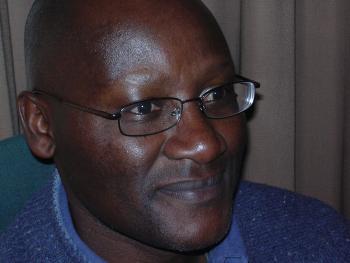Posted on July 27, 2010

Most family members would tell me bits and pieces, but would invariably suggest that I meet some family elders. With one exception, all of these elders were male and mainly from my paternal side, but were reportedly very knowledgeable about our family history.
One day I went to see one of my 'uncles' to find out more about our family. A former teacher, I chose him because he was my late father's elder brother. I intended to record the conversation as I thought it would be good practice for my planned dissertation research. After the long preliminaries were done, we settled in his living room and I was eager to learn more about our family.
My 'uncle,' however, threw me off because all he wanted to talk about before anything else was the dispute he and his brother, my late father, had regarding their inheritance (my grandfather's shops). I tried to say to my 'uncle' that he should tell me about our family rather than his squabbles with his late brother. He insisted, however, that as the first born of my father, it was important that we talk about this issue first before he would no tell me anything else about our family/clan history. I managed to listen for a few minutes longer, but then lost it completely: I told him that I was not my father and stormed out of the house and of his yard.
As I was driving away and reviewing what had just happened, I began to see the failed conversation with my 'uncle' in a different light. What I had initially thought was a complete disaster, had in fact taught me about the complexity of family/clan history. In his insistence to talk about the conflict with his brother, partly defined the way he understood our family history. While I had expected to hear about a 'big, happy family,' he was telling me that for him, conflict was equally part of our family history. For him, this conflict with his brother, my father, formed an important entry into our family, but I was dismissive and thought it was my 'uncle' living up to his well-earned reputation as a quarrelsome person. With this growing realization of what I had just missed from the family patriarch, my decision to storm out of his house no longer looked 'heroic.'Â Yet, I took away an important lesson about the intricacies of accessing family history and indeed the challenges of oral history more generally.
In subsequent year, however, I would learn about the family history from a different source though perhaps not as versed as my 'uncle.' I began to attend meetings of the family/clan association at different relatives' homes at least once a month. Sundays, after church and with no clashes with funerals, is the popular day for such meetings. The association consisted of the descendants of one Magantsha and from a particular place: neither of which I knew about before. Men and women of this particular branch have their own branches within the association. Whoever's turn it is to host the association, introduces his family to others. The visiting members are encouraged to bring their children as well. I learned that some people I had known all along but with different surnames were in fact using their father's name and not the 'right' one. The history I learned here is largely one that sticks to tracing how we are all descendants of one or two individuals and from a particular place. It is a family history devoid of any conflict although conflict bubbles below the surface.
The description above is not unique to my family or clan. The search for a family/clan history is a popular and common one in the region and beyond. On any given Sunday, several other family associations meet on regular basis in different ways. Other than deaths and funerals, it would seem that announcements for family/clan meetings are the most important on the local radio station. Why?
Many of the family/clan history are for 'personal' reasons, but others appear to define their goals more broadly. In addition to the 'personal,' some are geared to mobilize for land claims and chieftainship. Nor is it entirely helpful to separate the two. When I recently asked the historian of one such associations of their importance, he first stressed the need to avoid relatives marrying one another unknowingly. In addition, the association was important in reclaiming land. Moreover, he traced his clan to Great Zimbabwe and claimed that its founder was one of the sons of the mambo or rulers there.
In their various forms, these associations provide one way to understand our complex histories today. Yet they also raise some questions. Why does it seem that most families have some kind of royalty links? What is wrong with 'commoner' families/clans? Who are the 'custodians' of these family histories and what kind of histories do they produce? Why do some individuals choose not to attend these meetings? How do we define families or clans? Who is included, remembered and who is and why? Why is my mother's side of the family seemingly not that important? What are the different ways that families keep together and what do they tell us about their pasts and presents?
In these associations, people are living and making histories that we need to pay closer attention to than we have so far.
Maanda Malaudzi grew up in Venda and teaches history at UCT with an interest in the social history of the countryside focusing on the Limpopo province.